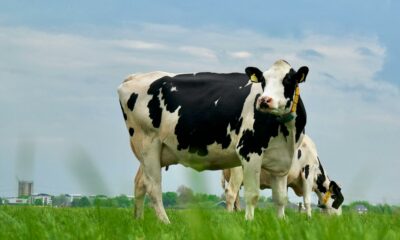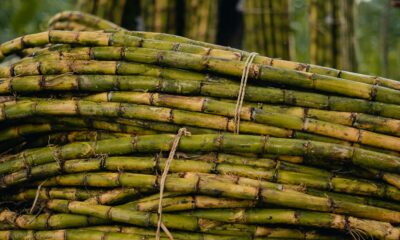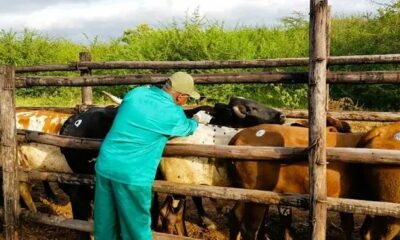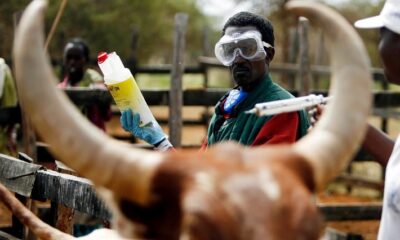News
Why the Foot and Mouth Disease Outbreak in KZN Should Worry Everyone, Not Just Farmers
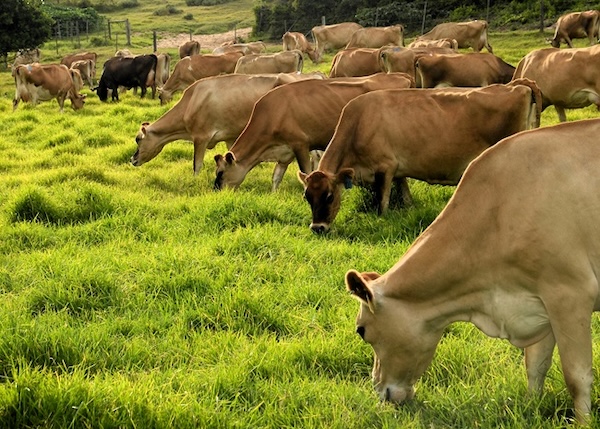
A rising crisis that’s not only about cattle—it’s about food, jobs, and national stability
In Taung, it’s lottery wins that make headlines. But in KwaZulu-Natal, the farming community is facing a very different kind of shock: an outbreak of Foot and Mouth Disease (FMD), and it’s threatening far more than just animal health.
On May 30, one of the country’s largest meat producers, Karan Beef, hit pause on all new livestock purchases after detecting a suspected case at its feedlot. Pre-emptive quarantine measures were quickly enforced—but the damage might already be rippling through the agricultural sector.
What Is FMD and Why Should You Care?
FMD is a viral disease that hits livestock hard—cattle, pigs, goats, sheep, and even some wild animals. It causes fever and painful blisters on the mouth and feet, making it hard for animals to eat or move. While most adult animals survive, many young ones don’t, especially if their mothers stop producing milk.
Humans can’t catch FMD, but we sure do feel its bite.
It affects the supply of meat, dairy, and livestock products. It drives up prices in supermarkets. And it wreaks havoc on trade.
A Call for Help from KZN Farmers
With the outbreak confirmed, livestock farmers in KwaZulu-Natal have called on the government to declare the province a disaster area. That’s not a small ask—it reflects just how serious the economic and emotional toll has become for those whose livelihoods depend on healthy animals.
In rural parts of South Africa, like many regions in KZN, livestock isn’t just income—it’s status, inheritance, bride price, and insurance. A cow is more than a meal; it’s a lifeline.
If herds start dying, it doesn’t just mean fewer boerewors on the braai. It could mean job losses, collapsing businesses, and food shortages—especially in small towns that already operate on the margins.
Economy Under Pressure
The Department of Agriculture warns that FMD could slam South Africa’s livestock exports. Countries with outbreaks often face immediate trade restrictions, and this impacts everything from small-scale farms to major commercial exporters.
According to the World Organisation for Animal Health (WOAH), infected animals often suffer from long-term health setbacks—growth delays, fertility problems, and milk production drops of up to 80%. That’s not just a farmer’s problem. That’s our dinner table problem.
From the Feedlot to the Checkout Line
We’re already seeing early consequences. Export prices are climbing, and if the outbreak isn’t contained quickly, local meat and dairy prices are likely to follow.
Social media is starting to buzz with concern. One post on X read:
“Not the cows again! I still remember the price spikes last time. Hope the government moves fast.”
And that’s a valid worry—because the longer the outbreak lingers, the more we’ll all pay.
How It Spreads and How to Stop It
FMD spreads through saliva, milk, semen, and other fluids before animals show symptoms. That makes early detection tricky and prevention critical. It’s also highly contagious via clothing, vehicles, feed, or even air movement.
Recovered animals can still carry the virus and infect others—meaning one case in a feedlot can potentially trigger an entire regional outbreak.
That’s why Karan Beef’s swift quarantine may have been a crucial move. But is it enough?
What Farmers and Citizens Can Do
The Department of Agriculture has reminded livestock owners that under the Animal Diseases Act (1984) and the Consumer Protection Act (2008), it’s their legal responsibility to report suspected cases immediately and not move animals without official clearance.
Strict biosecurity—disinfecting tools, limiting farm visitors, and tracking new animals—is no longer optional. It’s a necessity.
And vaccination? It works—but only if at least 80% of livestock get immunised, and only if the vaccine matches the strain in circulation. That’s easier said than done in a country where veterinary resources are stretched.
The Bigger Picture: Food Security and Resilience
South Africa has weathered FMD before—but every outbreak chips away at national confidence, global trust, and rural stability.
FMD might not send people to hospitals, but it can send farmers into bankruptcy, workers into unemployment, and families into hunger. In a country already battling load shedding, unemployment, and inflation, we simply cannot afford to treat this lightly.
This isn’t just about cows. It’s about people.
And in times like these, vigilance is everyone’s responsibility farmers, retailers, consumers, and government alike.
{Source: IOL}
Follow Joburg ETC on Facebook, Twitter , TikTok and Instagram
For more News in Johannesburg, visit joburgetc.com



